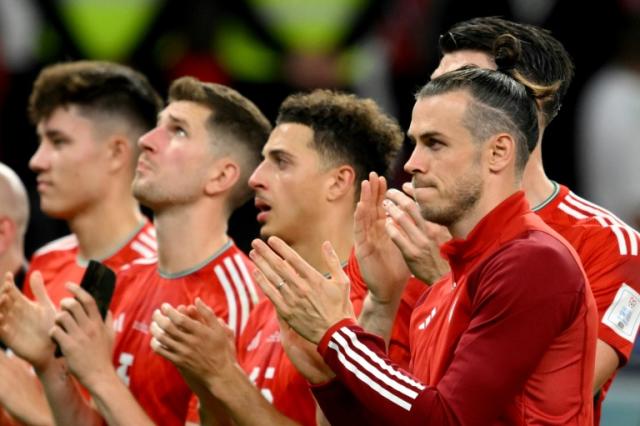Wales Exit Qatar After Defeat By England
After their defeat by England, Wales Exit Qatar. There was a sense of an ending that was more profound than the usual closure that comes with the conclusion of a team's tournament as Wales players and staff shared a moment with their fans after Tuesday's 3-0 loss to England had sealed their elimination from the group stage of the World Cup.
Author:David MitchellReviewer:Daniel ClarkDec 01, 202283 Shares1.4K Views

After their defeat by England, Wales Exit Qatar. There was a sense of an ending that was more profound than the usual closure that comes with the conclusion of a team's tournament as Wales playersand staff shared a moment with their fans after Tuesday's 3-0 loss to England had sealed their elimination from the group stage of the World Cup.
England's victory ensured that Wales would not advance past the group stage. After all, this was Wales' first appearance in the World Cup in 64 years; it was the fulfillment of a nation's hope for a very long time.
And as this dreamlike state faded to black beneath a desert night sky in Qatar, it felt like the end of an era - or at least the beginning of its end - unlike any other in the history of the country.
The History Of Welsh Football
Simply put, Wales has never before enjoyed such favorable conditions. Over the course of multiple generations, the name "Welsh football" had become synonymous with, at best, near-misses and storiesof agony, and, at worst, extended stretches of humiliating failure and outright apathy.
The longer it took to get into a major tournament, the more the World Cup of 1958 started to feel like a mysterious relic from a time that was too far in the past to fully comprehend.
Then, following the disappointment of losing to Scotland in 1977 and 1985, Romania in 1993, and a plethora of other false dawns, the golden generation emerged.
At first, they were teenagers playing under John Toshack's direction in the late 2000s; then, they blossomed under Gary Speed's instruction; and finally, they came of age at Euro 2016 with Chris Coleman in charge.
That summer in France was a gloriously cathartic experience for Wales, as it not only brought an end to the country's 58-year wait for a major tournament but also propelled it to dizzying new heights with a first-ever semi-final appearance.
After that, Gareth Bale, Aaron Ramsey, Joe Allen, and the rest of the team qualified for a second consecutive European Championship; however, a spot in a second World Cup remained elusive until this year.
The adventure is over now that all three group games have been played in Qatar.
At the same time that Robert Page and his players were applauding the Red Wall at Ahmad Bin Ali Stadium and enjoying one final performanceof "Hen Wlad Fy Nhadau," it was clear that the mutual love and respect was as strong as it had ever been.
The surge of national pride that Wales experienced as a result of its return to the world's most prestigious stage was unaffected by anything.
And while there is nothing that can be done to alter that reality, Wales must now focus its attention on the future while also making time to reflect on the past.
Wales can be immensely proud to have qualified for their first World Cup in 64 years, but they can also be deeply disappointed by their performances in Qatar.
The build-up was understandably epic given the historical significance, but whereas Wales had risen to the challenge in all three of their previous major tournaments to reach the knockout stages, they were unable to do so this time.
One of the most obvious reasons for their failures was the fading luster of an aging golden generation.
Bale, his country's record goalscorer and cap holder in men's football, has been the face of Welsh footballfor more than a decade, and many consider him to be the greatest player to come from Wales.
Ramsey and Allen may not be held in the same regard, but as their inclusion in Uefa's official tournament team for Euro 2016 demonstrated, they have been pivotal figures in the Welsh renaissance.
However, at this World Cup, all three were pale imitations of their former selves.
To be fair to Allen, his participation was limited by a hamstring injury, and despite starting all three games, Bale and Ramsey's dwindling club form and lack of match fitness caught up with them in Qatar.
Bale was forced off at halftime against England due to a tight hamstring, while Allen limped off near the end with what appeared to be a recurrence of his injury.
These seemed like indecent ways for two Welsh footballicons to leave what was almost certainly their only World Cup.
Final Words
Bale, 33, has already expressed his desire to continue playing for Wales, while Allen, 32, and Ramsey, 32 next month, have yet to make a decision.
They are all young enough to have an impact on Wales' chances of qualifying for Euro 2024, but even if they can help Wales qualify for a fourth major tournament out of five, their country cannot rely on them indefinitely.

David Mitchell
Author
David Mitchell is a versatile writer at Tennessee Independent, specializing in news, sports, and player profiles. With a keen eye for detail and a passion for storytelling, David brings a unique perspective to his articles, covering a wide range of topics that resonate with readers. His expertise in these areas ensures that readers receive insightful and engaging content, making him a valuable asset to the Tennessee Independent team.

Daniel Clark
Reviewer
Daniel Clark is an experienced author at Tennessee Independent, renowned for delivering insightful articles with a professional approach. With a focus on factual accuracy and authoritative insights, Daniel covers a wide range of topics, providing valuable information and engaging narratives. His expertise in areas such as performance, player profiles, and current events ensures that readers receive trustworthy and informative content. Daniel's commitment to delivering well-researched articles makes him a reliable source for expert perspectives on Tennessee Independent.
Latest Articles
Popular Articles